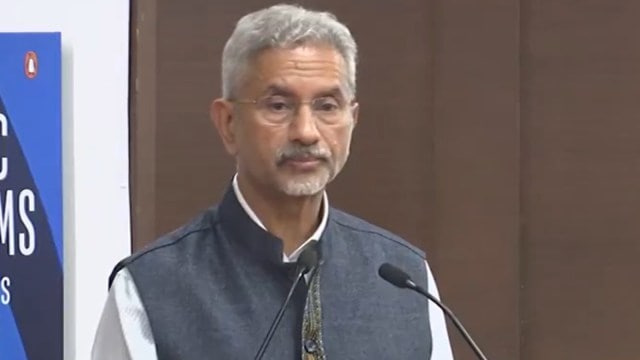What I do want to say is that we are not passive, and whether events take a positive or a negative direction, either way, we will react,’ said EAM Dr S Jaishankar

“The era of uninterrupted dialogue with Pakistan is over. Actions have consequences,” said Dr S Jaishankar. (X/ ANI)
Saying that the “era of uninterrupted dialogue” with Pakistan was over, External Affairs Minister S Jaishankar Friday asserted that India was “not passive” and will react “whether events take a positive or negative direction”.
Speaking at the launch of a book — Strategic Conundrum: Reshaping India’s Foreign Policy, by former diplomat Rajiv Sikri — Jaishankar also said that for any country, neighbours are “always a conundrum” as are “major powers”. “In case of China, you have a double conundrum, because it’s a neighbour and a major power,” he said.
The Minister’s comments come just weeks ahead of the Shanghai Cooperation Organisation (SCO) Summit being hosted by Pakistan in October. MEA spokesperson Randhir Jaiswal told reporters Friday that Pakistan had formally invited Prime Minister Modi to the SCO Summit, but said there was “no further update” on India’s participation. “We will let you know the situation later,” Jaiswal said.
Ties between India and Pakistan took a sharp dip in 2019, after the abrogation of Article 370 granting special status to Jammu and Kashmir. Both sides have not posted High Commissioners in each other’s capitals ever since. New Delhi has insisted the onus was on Islamabad to create an environment for talks that is free of terror and hostility.
Jaishankar said at the book launch: “I think the era of uninterrupted dialogue with Pakistan is over. Actions have consequences, and in so far as Jammu & Kashmir is concerned, (Article) 370 is done. So, the issue today is what kind of relationship can we possibly contemplate with Pakistan.” “What I do want to say is that we are not passive, and whether events take a positive or negative direction, either way we will react,” he said.
On ties with other neighbouring countries, including China, he said: “Major powers will be a conundrum because they are major, because of the breadth of their interests. They will always have an agenda, which will overlap with us, but to differing degrees, also diverge. In the case of China, you have a double conundrum, because it’s a neighbour and a major power. So, the challenges with China fits this double definition.”
With Afghanistan, Jaishankar said there were “strong people-to-people relations”. “At a societal level, there is a certain goodwill for India. But as we look at Afghanistan, the basics of statecraft should not be forgotten. There are international relations at work here. So when we today review our Afghan policy, we are very clear-eyed about our interests. We are not confused by ‘inherited wisdom’ that is before us,” he said.
An intergovernmental organisation established in 2001, the SCO aims to promote cooperation and peace among its members as well as foster “a new democratic, fair and rational international political and economic order.” It has nine members: China, Russia, India, Pakistan, Iran, Kazakhstan, Kyrgyzstan, Tajikistan and Uzbekistan.
Jaishankar also said there was a debate in the neighbourhood about two other groupings, SAARC and BIMSTEC. He described it as a contrast illustrating some challenges and opportunities of “regionalisation”.




